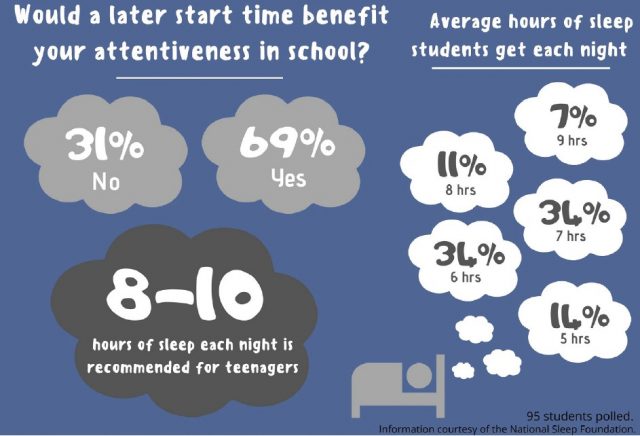New start times not in effect until at least 2021
March 9, 2020
For a little over a year, the East Penn School District administration has been investigating potential benefits and drawbacks associated with instituting a later start time.
Since announcing the investigation into the current Emmaus High School schedule and future possibilities, a use of time committee has been created. This committee is primarily comprised of EHS department heads, and representatives from the curriculum instruction office. At the Jan. 13 school board meeting, East Penn Superintendent Kristen Campbell addressed the work the committee has done, and the plans for the future.

This committee is looking into various aspects of the school day, and determining if the current EHS schedule is the best for the students. The current schedule has nine periods a day for 42 minutes, with five minutes in between each period, and a special Wednesday schedule, where class periods are shorter and there is a built in “study hall” called flex block.
Campbell stated that any changes to the current schedule would not be in effect until at least the 2021-22 school year. With the committee now starting preliminary research and planning, a new schedule will not be established as soon as next year.
“We certainly would not be poised or in a position to be able to implement any proposed changes to the schedule for next school year,” Campbell said. “[We would] use next school year to plan for any schedule changes that might be recommended and the first time that you would see a new schedule would potentially then be the 2021-22 school year.”
In December, surveys were administered to EHS students, teachers, and EPSD parents in order to gain more knowledge on how they feel on the topic.
EHS French teacher and world language department chair Deborah Kalb is a member of the committee and along with the other committee members, used these surveys to analyze what aspect of the day stakeholders value the most, and created a rubric highlighting them. Then, the committee is going to compare different schedules to see which one fits the rubric best.
“We looked at a ton of different schools and schedules, and then we kind of narrowed down about five that we really liked, plus our own current one,” Kalb said. “[Now] we’re going to run the schedules through that rubric to see how well they score based on what we said, as a community, we want.”
EHS Principal Dr. Kate Kieres recognizes the psychological effect such an early start time has on students, and also the amount of research EPSD still needs to complete.
“Research is conclusive that teenagers … have a hard time falling asleep at the time that they need to in order to get an adequate amount of sleep,” Kieres said. “By having a start time [as] early as we do, we’re consistently putting teenagers at a disadvantage in terms of their mental health and their ability to learn.”
Maddie Huffer, a sophomore at EHS, hopes administration implements a later start time due to the effect sports, homework, and other responsibilities have on her sleep schedule.
“A later start would help better improve my focus and many of my other peers that also struggle with the problem,” Huffer said. “I can say between me and my close friends that we’ve talked about the topic before and love the idea of a later start time.”
While to many a later start time may sound ideal, the district also has to recognize the effects it would have on other aspects of the school day, like after school activities; however, EPSD is only in the researching phase, and the end result is still questionable.












